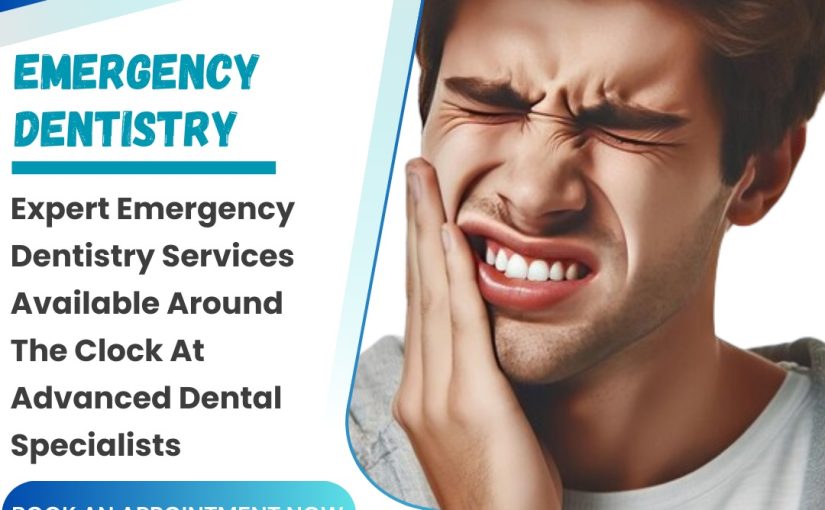How to Handle Dental Emergencies
Dental emergencies can occur unexpectedly, causing pain and anxiety. Knowing how to handle a dental emergency can save a tooth, prevent further damage, and relieve discomfort. This comprehensive guide will help you understand what constitutes a dental emergency, how to manage common dental emergencies, and when to seek professional help from Advanced Dental Specialists.
What Is a Dental Emergency?
A dental emergency is any oral health issue requiring immediate attention to alleviate severe pain, stop bleeding, or save a tooth. Common dental emergencies include:
• Severe toothaches
• Chipped or broken teeth
• Knocked-out teeth
• Loose or displaced teeth
• Lost fillings or crowns
• Abscesses or infections
• Soft tissue injuries (e.g., cuts, tears)
How to Handle Common Dental Emergencies
1. Toothaches
Symptoms:
• Persistent, severe pain
• Swelling around the tooth
• Sensitivity to hot or cold
Immediate Actions:
• Rinse your mouth with warm water.
• Use dental floss to remove any food particles stuck between teeth.
• Apply a cold compress to the outside of your cheek to reduce swelling.
• Avoid placing aspirin or painkillers directly on the gums as they can burn tissue.
Seek Professional Help: If the pain persists, contact Advanced Dental Specialists for an evaluation. Toothaches can indicate underlying issues such as cavities, abscesses, or gum disease that require prompt treatment.
2. Chipped or Broken Teeth
Symptoms:
• Visible crack or break in the tooth
• Sharp edges causing discomfort
• Pain when chewing or biting
Immediate Actions:
• Rinse your mouth with warm water.
• Save any broken pieces and keep them in a clean container with milk or saline solution.
• Apply gauze to stop any bleeding.
• Use a cold compress to reduce swelling.
Seek Professional Help: Contact Advanced Dental Specialists immediately. Dr. Avijit Goel can assess the damage and recommend appropriate treatment, which may include bonding, crowns, or veneers.
3. Knocked-Out Teeth
Symptoms:
• Complete dislodgement of a tooth from its socket
Immediate Actions:
• Handle the tooth by the crown (avoid touching the root).
• Rinse the tooth gently with water if dirty.
• Try to reinsert the tooth into the socket if possible.
• If reinsertion is not possible, place the tooth in milk or a saline solution.
Seek Professional Help: Time is critical. Contact Advanced Dental Specialists immediately. Quick action within the first 30 minutes to an hour can significantly increase the chances of saving the tooth.
4. Loose or Displaced Teeth
Symptoms:
• Tooth appears loose or out of alignment
• Pain or discomfort when chewing or biting
Immediate Actions:
• Apply a cold compress to reduce swelling.
• Avoid eating or using the affected tooth.
Seek Professional Help: Contact Advanced Dental Specialists promptly. Dr. Avijit Goel can stabilize the tooth and determine if further treatment is necessary.
5. Lost Fillings or Crowns
Symptoms:
• Visible hole or gap where a filling or crown was
• Sensitivity to temperature or pressure
Immediate Actions:
• Keep the crown or filling in a safe place.
• Use over-the-counter dental cement or a piece of sugarless gum to temporarily cover the gap.
Seek Professional Help: Schedule an appointment with Advanced Dental Specialists to have the filling or crown replaced.
6. Abscesses or Infections
Symptoms:
• Painful, swollen bump on the gums
• Fever or feeling unwell
• Bad taste in the mouth
Immediate Actions:
• Rinse your mouth with a mild saltwater solution to reduce swelling and draw out infection.
Seek Professional Help: Contact Advanced Dental Specialists immediately. Abscesses and infections require prompt treatment to prevent the spread of infection.
7. Soft Tissue Injuries
Symptoms:
• Cuts, tears, or lacerations in the mouth
• Bleeding
Immediate Actions:
• Rinse your mouth with a mild saltwater solution.
• Apply gauze or a clean cloth to stop bleeding.
• Use a cold compress to reduce swelling.
Seek Professional Help: If bleeding persists or the injury is severe, seek immediate care from Advanced Dental Specialists.
Preventing Dental Emergencies
While accidents happen, you can reduce the risk of dental emergencies by:
• Wearing a mouthguard during sports or physical activities
• Avoiding chewing on hard objects like ice or pens
• Maintaining good oral hygiene to prevent decay and gum disease
• Regular dental checkups to catch issues early
Conclusion
Handling dental emergencies promptly and correctly can make a significant difference in the outcome. Advanced Dental Specialists, led by Dr. Avijit Goel, is here to provide expert care and support when you need it most. If you experience a dental emergency, don’t hesitate to contact us immediately. Your oral health and comfort are our top priorities. Stay prepared and take proactive steps to protect your smile.

